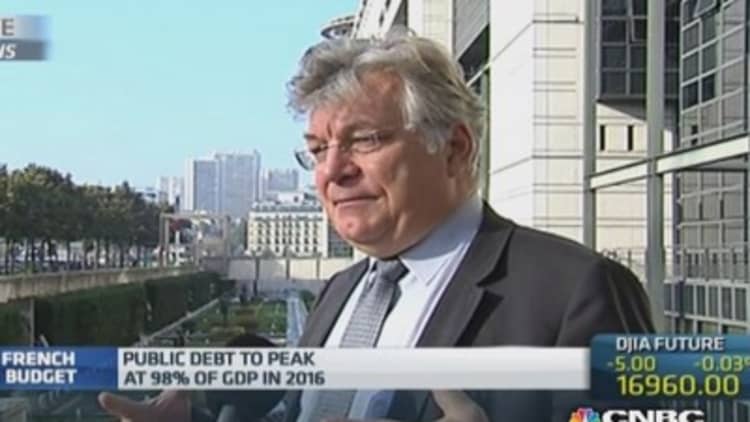The French government presented its 2015 budget on Wednesday, unveiling a 50 billion euro ($63 billion) savings program cutting deep into the country's beloved welfare system.
However, although the government pledged to reduce its spending by $26.5 billion in 2015 and $18.3 billion in both 2016 and 2017, it reaffirmed its forecast that it would need an additional two years to bring its budget deficit below the 3 percent of gross domestic product (GDP) mandated by European authorities.
Philippe Waechter, head of economic research at Natixis Asset management, believes the country shouldn't have many difficulties in obtaining approval for a delay –the third in two years – to get its deficit under the Brussels-approved threshold.
"When we look at the French growth process, it's largely dependent on government expenditures, so if there is a strong decrease in public expenditures, it would be a risk for growth in France but also for the whole euro area" explained Waechter.
Welfare in the line of fire
The welfare system will undergo many changes, allowing for over $25 billion of savings to be made over the next three years.
The cuts unveiled on Monday by Marisol Touraine, minister of social affairs, health and women's rights, include a decrease in childcare benefit for higher earners, less parental leave and a cut to the existing child birth benefit.
Read MoreCut holidays to create jobs: French business chief
Previously, families could receive up to 923.08 euros ($1,164) at the birth of every child but will now receive up to 308 euros ($388.5) for the second and following children.
Additionally, processes will be put in place to cut time spent in hospital and medical practitioners will be monitored and sanctioned if they prescribe too many drugs. All drugs prescribed by a doctor are partially or fully reimbursed in France provided patients are enrolled in government-financed health insurance.
The social security reforms have already been widely criticized by the public but the French President, Francois Hollande stood firm on Tuesday telling a press conference that "no savings program is painless".

President not spared
The state will cut its subsidies to local governments by 11 billion euros ($13.9 billion) by 2017. But the ministry of finance estimates that it would have little impact on local spending as regions and districts continue to receive an increasing share of local taxes.
Furthermore, the state will save by modernizing its processes, reducing its headcount – except in education, justice and security – and slashing the budget allocated to ministries.
The president has already tighten his own purse strings and has, according to the French radio Europe 1, reached the target he had given himself by bringing the Elysee Palace's spending below 100 million ($126 million ) a year from 109 million under his predecessor, Nicolas Sarkozy.
To achieve that, Francois Hollande has increased the number of invitations to tender, reduced the workforce at the Palace, cut the numbers of official cars – even installing an electric charging station – and slashed the budget for official travel.
Read MoreSarkozy stands by as France's socialists suffer
His visit to New York last week cost the tax payer 600,000 euros ($757,000). The same trip cost Nicolas Sarkozy 1 million euros ($1.26 million) in 2011.
Optimistic forecasts?
France warned that its public deficit will stand at 4.4 percent of GDP in 2014, declining to 4.3 percent in 2015, 3.8 percent in 2016 before finally dropping below 3 percent -2.8 percent- in 2017.
However, these forecasts are based on the government's growth expectations. The country estimates that it will grow 0.4 percent this year and 1 percent next year.
But France's public finances watchdog immediately rained on the government's parade on Wednesday, reaffirming its belief that although the 2014 growth expectation is "realistic", the 2015 forecast is less so.
In its latest report released on Sept 26, the watchdog writes that the 2015 growth forecast seems "optimistic", as it is based on a quick and stable recovery in activity "which the latest indicators do not suggest".
Read More France: Braced for a 'tough autumn'


